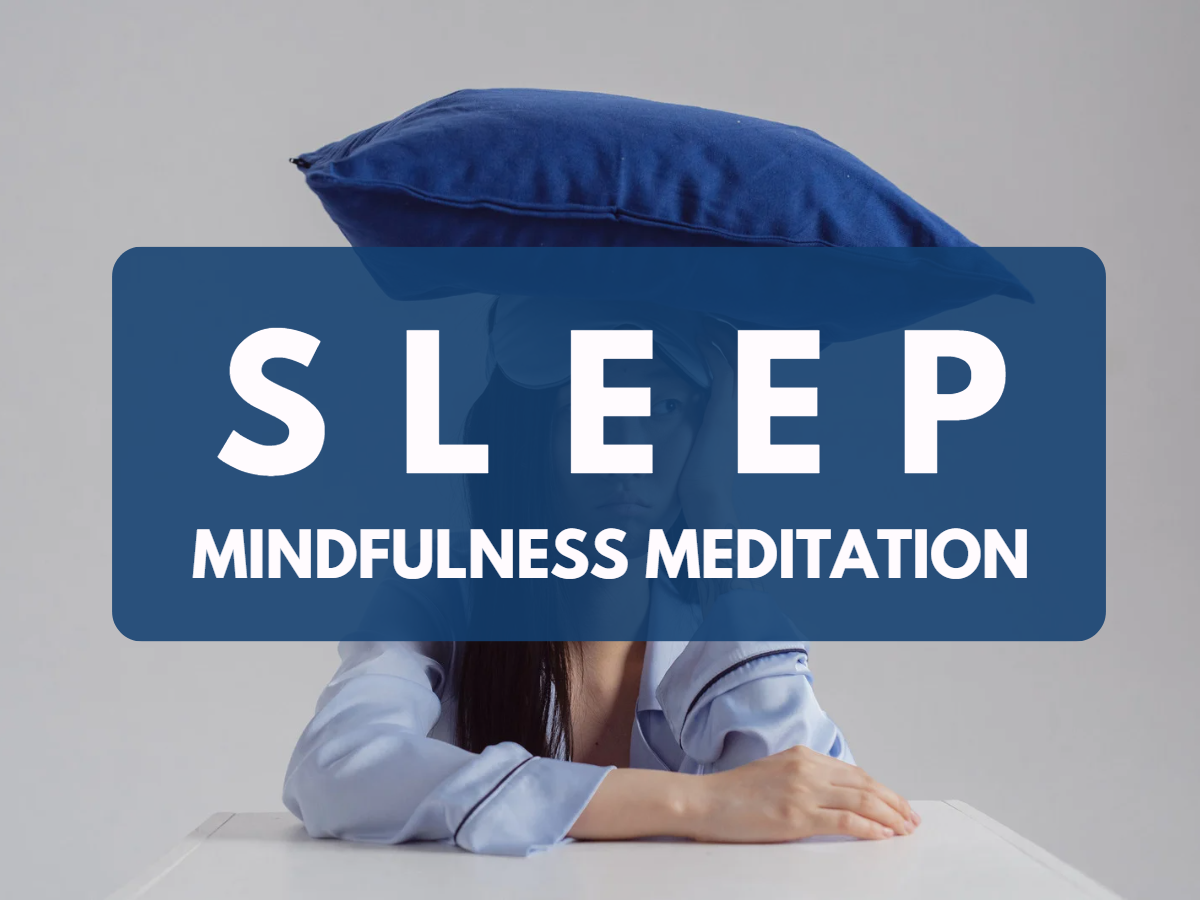Sleep Mindfulness Meditation
Hey there! Are you having trouble sleeping?
We understand how frustrating it is when you can’t seem to get a good night’s rest. Have you ever considered trying mindfulness meditation to help improve your sleep quality?
Mindfulness meditation has improved sleep quality in various clinical populations with sleep disturbance.
Let’s take a closer look at the evidence.
Can mindfulness meditation help you sleep?
Mindfulness meditation can be an effective tool for improving sleep quality.
According to a randomized controlled trial (RCT) study, mindfulness meditation has been found to improve sleep quality in people who have trouble sleeping. It includes people with clinical sleep disturbances. That’s cool.
The study mentioned no significant difference in sleep quality between mindfulness meditation and other evidence-based sleep treatments. However, the strength of the evidence could have been higher, which means that more research is needed to understand the results fully.
But here’s the interesting part. The study found that mindfulness meditation significantly improved sleep quality compared to nonspecific active controls. What does that mean? Well, it means that when mindfulness meditation was compared to other active treatments that didn’t specifically target sleep, it still positively impacted sleep quality. That’s promising!
In fact, the Sleep Foundation states mindfulness meditation may improve sleep quality levels similar to exercise.
Of course, more research is needed to understand how mindfulness meditation affects sleep.
But the evidence so far is worth considering.
But how exactly does it work?
Let’s take a closer look!
During mindfulness meditation, your body undergoes physiological changes that promote relaxation and calmness. These changes include decreased heart rate and blood pressure and increased melatonin production, a hormone that regulates sleep. By regularly practicing mindfulness meditation, you can train your body to relax and prepare for sleep, making it easier to get quality sleep throughout the night.
What is the science behind sleep meditation?
Did you know that practicing meditation could help you sleep better? Research suggests that several physiological changes occur in the body during meditation that can promote relaxation and calmness, making it easier to fall asleep and stay asleep.
One such change is the increase in serotonin and melatonin levels after meditation, neurotransmitters associated with “rest and fulfillment” and sleep. At the same time, the levels of norepinephrine, a neurotransmitter associated with anxiety, decrease after meditation.
This means meditation can positively impact your body’s ability to regulate sleep hormones and neurotransmitters. When these chemicals are in balance, falling asleep and staying asleep becomes easier.
So if you’re struggling with sleep issues, why not incorporate mindfulness meditation into your daily routine? With regular practice, you can fall asleep more quickly and stay asleep longer, leading to improved overall sleep quality.
What are the nine Mindfulness principles, and how are they related to sleep?
The nine principles of mindfulness meditation, such as nonjudging, gratitude, patience, a beginner’s mind, trust, non-striving, acceptance, letting go, and generosity, can all be applied to help promote better sleep. By learning to accept your thoughts and feelings without judgment, letting go of stress and anxiety, and cultivating feelings of gratitude and generosity, you can create a more peaceful and restful mindset to help you sleep more soundly.
Here is exactly how!
- Nonjudging: Mindfulness meditation encourages you to observe your thoughts without judgment. This can be helpful when trying to fall asleep because it allows you to let go of any racing thoughts that might keep you awake. For example, if you think about everything you must do tomorrow, you can acknowledge your thoughts without getting caught up in them.
- Patience: Mindfulness meditation teaches you to be patient with yourself and your thoughts. This can be helpful when you’re lying in bed and struggling to fall asleep. Instead of getting frustrated and anxious, you can practice patience and allow yourself to relax and drift off to sleep.
- Beginner’s mind: Mindfulness meditation encourages you to approach each moment with a beginner’s mind, without preconceptions or expectations. This can be helpful when you’re trying to fall asleep because it allows you to let go of any past experiences or worries about not being able to fall asleep.
- Trust: Mindfulness meditation encourages you to trust yourself and your body. This can be helpful when you’re lying in bed and worrying about not being able to fall asleep. By trusting that your body knows how to sleep, you can relax and let yourself drift off.
- Non-striving: Mindfulness meditation encourages you to let go of the need to achieve or strive for something. This can be helpful when trying to fall asleep because it allows you to let go of any pressure you might be putting on yourself to fall asleep.
- Acceptance: Mindfulness meditation encourages you to accept things without trying to change them. This can be helpful when you’re lying in bed and struggling to fall asleep. By accepting that you’re having difficulty falling asleep, you can let go of any resistance and allow yourself to relax.
- Letting go: Mindfulness meditation teaches you to let go of attachments or desires. This can be helpful when trying to fall asleep because it allows you to let go of any worries or expectations about how much sleep you should be getting or how quickly you should fall asleep.
- Gratitude: Mindfulness meditation encourages you to focus on what you’re grateful for rather than what you’re lacking. This can be helpful when you’re lying in bed and struggling to fall asleep. By focusing on what you’re grateful for, you can cultivate feelings of relaxation and contentment, which can help you fall asleep.
- Generosity: Mindfulness meditation encourages you to be generous with your thoughts and actions. This can be helpful when you’re lying in bed and struggling to fall asleep. By focusing on being kind and compassionate toward yourself and others, you can cultivate feelings of relaxation and well-being, which can help you fall asleep.
What is sleep mindfulness meditation?
Sleep mindfulness meditation is a specific type of mindfulness meditation that is designed to be practiced right before bed. It aims to help you relax and reduce stress or worries that may be keeping you up at night.
Unlike traditional meditation, sleep mindfulness meditation is typically practiced lying in bed.
What’s the best sleep meditation?
Different types of sleep meditation techniques can help you fall asleep and improve the quality of your sleep; here are some examples:
- Guided Meditation: In this technique, a person listens to an audio recording of a soothing voice that guides them through meditation. The voice provides instructions and helps you visualize calming images or situations. This type of meditation can help you relax and let go of any thoughts that may be keeping you awake.
- Body Scan: This technique involves focusing on different body parts and relaxing them individually. It can help you become more aware of physical sensations and reduce muscle tension. You can start from the top of your head and work your way down to your toes, or vice versa.
- Visualization meditation: Imagine yourself in a peaceful and serene environment, such as a beach or a forest. Engage all of your senses and allow yourself to experience the scene’s peacefulness fully.
- Guided meditation with nature sounds: There are many guided meditations available online that include the sounds of nature, including rainfall, ocean waves, or birds chirping. These calming sounds can help you relax and fall asleep faster.
- Breath awareness meditation: Focus on your breath and observe each inhale and exhale. If your mind wanders, try to gently bring it back to your breath.
Is Mindfulness a Treatment for Insomnia?
Mindfulness can be a treatment for insomnia as it helps people be more accepting of their experience when they have difficulty sleeping. Treatment programs featuring mindfulness meditation are considered viable treatment options for insomnia.
Here are some important points to consider:
- Mindfulness can help people develop a new perspective on their insomnia by changing how they relate to it.
- It can reduce stress, anxiety, and rumination, common insomnia culprits.
- It can help people develop a more relaxed and peaceful mindset, enhancing sleep quality.
- Studies have suggested that mindfulness meditation may improve sleep quality and reduce insomnia symptoms.
- Mindfulness-based therapies like mindfulness-based stress reduction (MBSR) and mindfulness-based cognitive therapy (MBCT) have been used to treat insomnia with promising results.
However, further research is needed to determine who will likely benefit from mindfulness-based therapies and how these interventions work. Additionally, issues related to the delivery and implementation of mindfulness-based treatments still need to be resolved.
It’s important to note that while mindfulness meditation can help treat insomnia, it should not replace conventional treatments recommended by a healthcare provider.
You can also try a few YouTube guided sleep meditations.
YouTube guided sleep meditations:
YouTube guided sleep meditations are available that can help you relax and fall asleep. Here are some popular ones:
- “Guided Meditation for Sleep” by The Honest Guys – This guided meditation includes relaxing music and visualization techniques to help you drift off to sleep.
- “Sleep Meditation for Deep Relaxation” by Jason Stephenson – This guided meditation includes peaceful nature sounds and soothing music to help calm your mind and body.
- “Guided Sleep Meditation for Insomnia” by Michael Sealey – This guided meditation includes breathing exercises and relaxation techniques to help ease insomnia.
Remember, it may take some time to find the right guided sleep meditation for you, so be patient and keep trying until you find one that works best for you.
Deep sleep guided meditation
Deep sleep guided meditation is a type of meditation that aims to help people achieve a state of deep relaxation and, ultimately, a good night’s sleep. This meditation technique usually involves a soothing voice guiding the listener through various relaxation techniques, breathing exercises, and visualizations to help them calm their mind and body and drift off into a peaceful sleep.
Here are some important points to consider while searching for deep sleep guided meditations:
- Choose a reliable source: Many guided meditation videos are available on YouTube, so choosing a reliable source is important. Look for guided meditations from trusted meditation teachers or channels with a good reputation for providing high-quality content.
- Find a voice that resonates with you: Meditation teachers have different styles and voices. Finding a voice that resonates with you and helps you feel relaxed and comfortable is important.
- Look for a meditation that suits your needs: Different guided meditations address different issues, such as reducing anxiety, promoting relaxation, or improving sleep quality. Look for a meditation that specifically addresses your needs.
- Consider adding soothing music or nature sounds: Some guided meditations include soothing background music or nature sounds, which can help enhance the relaxation experience.
Overall, deep sleep guided meditation can be a helpful tool for those struggling with insomnia or difficulty sleeping. By helping to calm the mind and body, these meditations can promote a more restful and rejuvenating sleep experience.
Key Takeaway
If you struggle with getting enough sleep, incorporating mindfulness meditation into your nightly routine may help. It can help you quiet your mind, relax your body, and fall asleep more easily. If you’re interested in exploring mindfulness meditation further, check out the link provided for resources and tools to get started. Sweet dreams!

